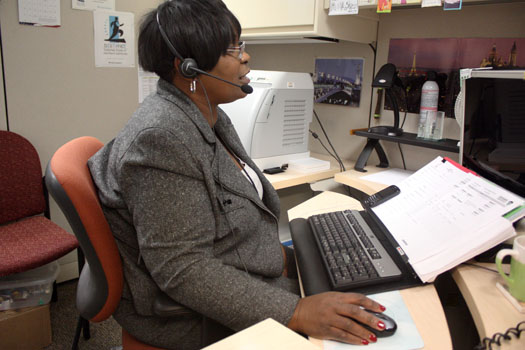It’s simply a case of cause and effect. To recruit 500,000 Northern California Kaiser Permanente members for a research project, the Research Program for Genes, Environment and Health (RPGEH) had to gracefully and efficiently handle the masses of mail and flocks of phone calls that would be headed its way.
That’s why the Division of Research created a nine-person, behind-the-scenes team led by Marcia Ewing. Her team swung into action when the project’s first batches of consent requests went out in early 2008, asking 400,000 Kaiser members, 60,000 at a time, to become research participants.
During peak response times, Ewing and her team processed up to 3,000 pieces of mail and 300 phone calls a day, answered questions and guided callers through the consent process.
In a flurry of mail and phone calls, Ewing kept her cool
At the center of the storm, Ewing kept her cool. It’s an invaluable skill the former nurse has learned after 20 years in research, including 14 at the Division.
“I knew she was the right person for this job,” said Sarah Rowell, MPH, the project’s associate director of research operations. Rowell, who had worked with Ewing on other division projects, chose her to head the team. She valued Ewing’s wealth of experience and calmness under pressure. “She’s extraordinary in terms of the work that she orchestrates,” said Rowell.
As smoothly as a professional string ensemble, five of Ewing’s staff members open mail, scan and file completed consents, and make sure participants’ samples move quickly and securely to the right place. Another coworker prepares participant contact lists and updates the mailing list.
Photo Gallery: RPGEH mail room team
[portfolio_slideshow exclude=”541″]Well-oiled process helps Kaiser Permanente members participate
It’s all part of a well-oiled process to help Kaiser Permanente members join and participate in the research project with ease and convenience.
Meanwhile, Ewing and three other staff members work the phones. Unlike many studies, the project’s size and resources allow Ewing’s team to answer live calls to the 800-number for at least 20 hours a week.
When callers need some extra TLC, they’re referred to Ewing. If necessary, she gives callers a chance to talk and ask questions. Then she explains the project. That’s why she has become known as the soothing “voice” of the RPGEH.
Ewing, born in Panama to a Panamanian mother and United States-born father, credits her cheerful, thoughtful approach to her mother. Mom’s lesson: the best way to get respect is to give respect.
“I put myself in the caller’s shoes,” said Ewing. She answers questions, gives participants all the information they need and explains what scientists hope to accomplish with the rich data resource being created through the RPGEH.
RPGEH to benefit the future
“It’s not to benefit us right now, it’s to benefit the future,” she tells callers. “Participants are interested in the health of their children and grandchildren. Participating in this program gives them a real way to make a contribution toward better health for future generations.”
Ewing also has a personal reason for taking this research seriously. She has multiple sclerosis, well controlled by medication, and knows that MS is one of the diseases RPGEH investigators are studying.
Ewing has two college-age children, and like the RPGEH participants she helps every day, she hopes that linking the genes, behaviors and health outcomes of 500,000 Northern California Kaiser Permanente members will benefit all their children, as well as generations to come.





Comments (0)